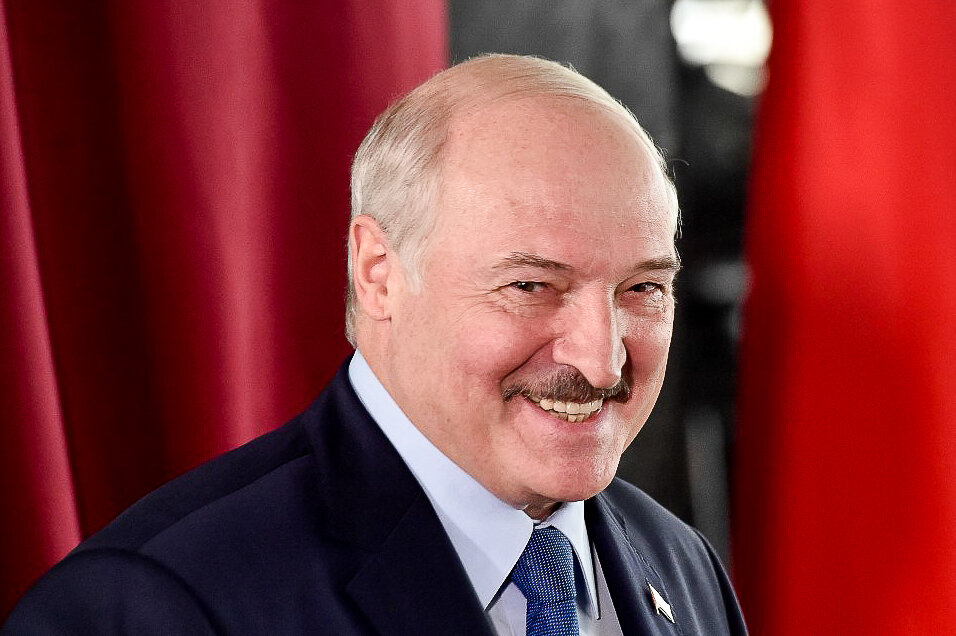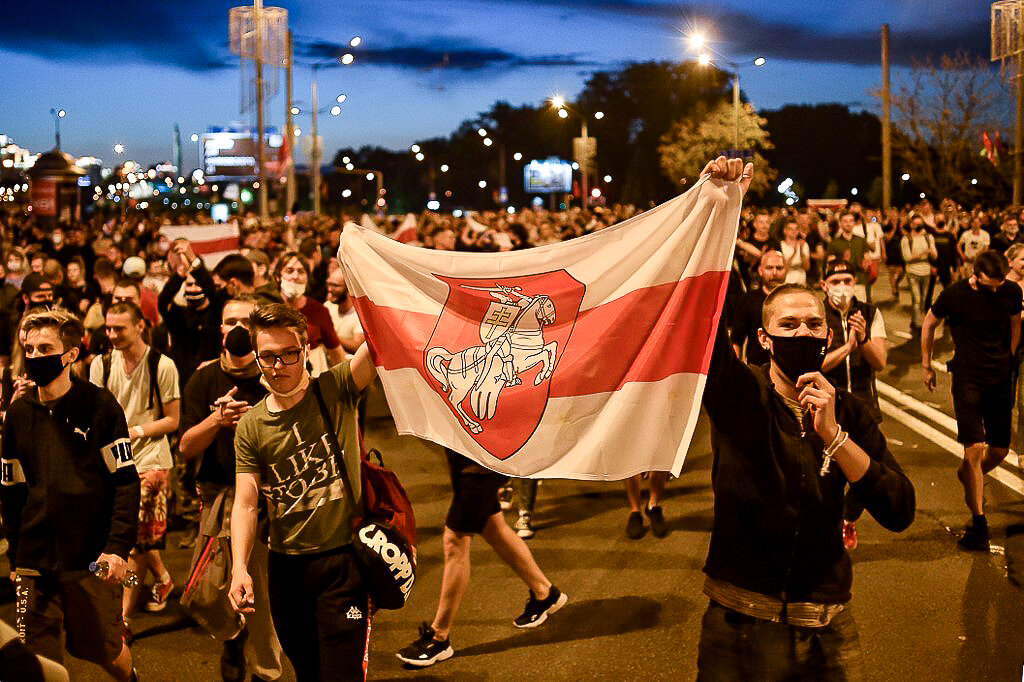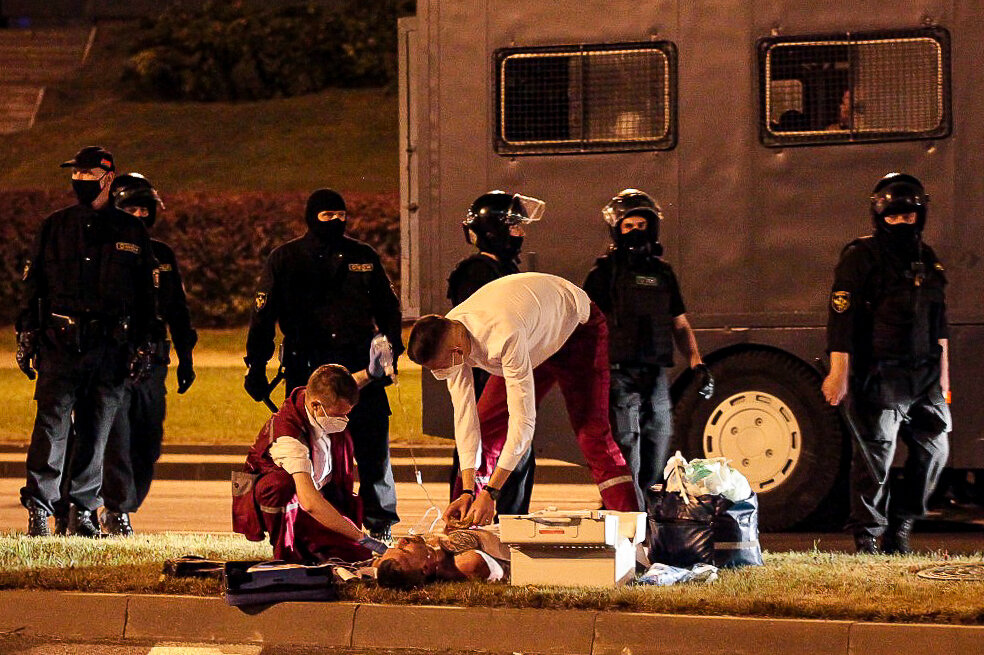Elections in authoritarian Belarus have long been only a simulacrum of democracy.
So it wasn’t a surprise for many when a government-backed exit poll declared incumbent President Alexander Lukashenko the winner of the Aug. 9 presidential election.
Though several authoritarian rulers rushed to congratulate Lukashenko with his landslide victory, the people of Belarus were quick to take to the streets of seemingly every large city to protest against the allegedly fraudulent results.
Thousands of Belarusians came out to demand a fair count. In response, riot police used water cannons, flash grenades and rubber bullets to clear the streets of protesters standing up for their rights. One person was reportedly killed in the clashes, while dozens are currently being treated in hospitals with injuries.
The international community has expressed concern with both the election and the aggressive response of the police to peaceful protesters. Some were more forceful in their statements than others.
Lithuania’s Foreign Ministry wrote in an official statement that the “presidential elections in Belarus were not free nor fair.”
“The government of Belarus once again failed to ensure respect for human rights and freedoms,” the statement reads. “The use of excessive force against peaceful demonstrators is absolutely unacceptable.”
Ukrainian President Volodymyr Zelensky wrote on Facebook that “it is obvious that not everyone in (Belarus) agrees with the announced results,” adding that “any legitimacy arises solely from public trust.”
German Foreign Minister Heiko Maas said on Aug. 10 that the European Union should review the previously-lifted sanctions on Belarus. In 2016, the EU lifted sanctions imposed on Belarus and President Lukashenko citing progress in improving the rule of law in the country.
Demanding fair count
Even before election day, many Belarusians had already deemed the vote to be unfair due to restrictions on the opposition. Their fears were further confirmed when the official count gave Lukashenko 79% of the vote.
People began to line up in front of local election commissions demanding a fair count. Some local commissions have responded by declaring opposition leader Svetlana Tikhanovskaya as the actual winner.
Although Tikhanovskaya officially received only 9% of the total vote, many local election commissions gave her an unprecedented 80%. Exit polls conducted outside Belarusian embassies abroad gave her, on average, 90% of the vote.
The vast disparity between the official numbers and the results from an independently conducted count drove people to the streets. Their protests, however, were met by an unprecedented level of brutality from the police.
According to the Interior Ministry of Belarus, protests occurred in 33 cities across the country, resulting in over 3,000 arrests.
Viasna, a non-governmental human rights group, issued a statement saying that one protester was killed. The Interior Ministry of Belarus didn’t confirm the death of the protester.
Viasna also wrote that many more people with injuries from rubber bullets were currently being treated in hospitals. Even though the Belarusian police have denied these claims, photos from the Aug. 9 protests suggest the opposite.
Following public outrage, on Aug. 10, Tikhanovskaya declared herself as the winner and urged the people to stand up for their rights.
“We call on those who believe that their vote was stolen not to be silent,” she said, adding, however, that she is ready to meet with Lukashenko for negotiations.
International reaction
Despite the lack of transparency during the vote and the police brutality afterwards, the leaders of authoritarian states rushed to congratulate Lukashenko with his sixth consecutive presidential victory. According to the European Union, only Lukashenko’s first victory in 1994 qualified as fair.
So far, among the state leaders who have congratulated Lukashenko are: China’s Xi Jinping, Kazakh President Kassym-Jomart Tokayev, and Russian President Vladimir Putin.
Unlike their authoritarian counterparts, democratically elected leaders have expressed concern about the election, police brutality and nationwide protests.
Polish Prime Minister Mateusz Morawiecki urged the European Union to hold an extraordinary session to discuss the Belarusian elections.
Zelensky asked the Belarusian authorities to hold dialogue with the opposition.
“We call for the most open, albeit complex, dialogue… Both the government and the protesters should be interested in such a dialogue,” Zelensky said. “Belarus must adhere to the generally recognized democratic standards in the civilized world.”
Fifty-seven Ukrainian lawmakers – representing the 248-member Servant of the People party and the 20-member opposition Voice party – signed an official letter calling on the Belarusian authorities to respect the will of the people.
“In order to preserve peace, we call on the representatives of the (Belarusian) government to provide reliable and clear answers to the protesters’ questions as soon as possible,” the report reads.
Morawiecki was more direct in his assessment of the election. In an open letter to Ursula von der Leyen, president of the European Commission, Morawiecki wrote that Poland has a duty to support the people of Belarus.
“We must support the Belarusians in solidarity (with) their striving for freedom,” Morawiecki wrote in the letter made public by his office.
Experts and political commentators have also expressed solidarity with the protesters in Belarus.
“The pictures from Minsk contradict the official narrative of a re-elected president. We see a rejected president who has declared war on his own people, the president who has systematically broken the law and order of his own country,” wrote Donald Tusk, former president of the European Council who currently serves as the leader of the European People’s Party
“The history of protests across Emerging Europe in recent years tells us that street protests can go on a long time, but in recent years we have not seen these (protests) facing quite the extremity of the security services as we are now seeing in Minsk,” wrote Timothy Ash, a senior emergency market strategist for Bluebay Asset Management Company. “(It) takes very brave people to stay on the streets.”
“Call it a Maidan, an uprising, a revolution — but from tonight Belarus will never be the same. The people have said enough is enough and have come out throughout the country to force Lukashenko out,” wrote Ukrainian-American journalist Bohdan Nahaylo.
Lukashenko responds
On Aug. 10, Lukashenko gave a comment to state-owned media about the election and the protests that followed. According to him, the demonstrations were orchestrated from abroad. He also called those protesting “sheep.”
“We recorded calls from abroad, there were calls from Poland, Great Britain and the Czech Republic,” said Lukashenko. He also accused people from Ukraine of conspiring against his regime.
“They managed our sheep, that didn’t understand what they were doing,” Lukashenko said.

Belarus’ President Alexander Lukashenko smiles as he votes at a polling station during the presidential election in Minsk on Aug. 9, 2020. (AFP)
On Aug. 9, journalists in Minsk reported that the internet connection was down and a number of independent news websites weren’t working. A day later, there are still severe problems with internet connection in the city.
Lukashenko said that the internet in downtown Minsk wasn’t working because of foreign interference.





